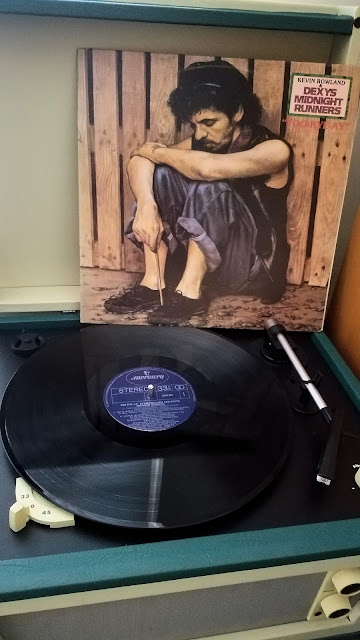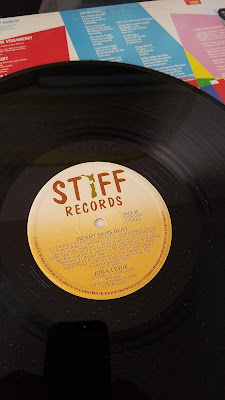"Roll up roll up for the Mystery Tour
Roll up roll up for the Mystery Tour"
This copy of the album proved to be both magical and mysterious.
Read on, all will be revealed.
Let's be very clear, this is about the music, NOT the excruciatingly painful made-for-TV film. The best bit of the film was The Bonzo Dog Doo-Dah Band singing 'Death Cab For Cutie'. The other non-Beatle song was cut. Traffic performed "Here We Go Round the Mulberry Bush".
Back in the day I had the original 1967 7" double EP. It came in a hard cover complete with 24 page booklet and had 6 songs over 4 sides. I've checked it online and some copies are now being sold for silly money. However, mine is laying discarded along life's long and winding road (not a song on the EP by the way). Translation: I don't know where it is.
Tracy on the other hand, has this US issued LP. Because the original soundtrack only had 6 songs it was not enough for a full album and so the decision was made to release it as the very first UK double EP. It was felt that the US market wasn't as receptive to EP's so an additional 5 non-album singles were added to make the US release a full LP. Just as a side note, The Beatles were not happy about that. They wanted the music from MMT to be stand-alone. The playing order of the 6 soundtrack songs was changed from the original EP to this LP, which further upset the 'Fab Four'.
The 6 songs themselves tend to follow in the same vein as 'Sgt. Pepper ..' The title track does the same by working as an introduction to the event (MMT) the same as the title track of 'Sgt Pepper' introduced the band.
'Your Mother Should Know' was almost used in the "Our World" broadcast, the world's first global live television link. Instead as we all know, 'All You Need Is Love' rang out around the globe instead. 'Your Mother Should Know' is reminiscent of 'When I'm Sixty-Four' in style.
'I Am the Walrus' is apparently John Lennon's response to finding out that that Beatle lyrics were being used by Engish literature teachers. He figured he'd write something that nobody could analyse or interpret.
I think he succeeded.
The title of 'Fool On the Hill' could well have come from McCartney's liking of a Dutch crowd called "The Fool" who in turn took their name from the design of "The Fool" tarot card.
'Flying' and 'Blue Jay Way' complete the original soundtrack songs.
I love 'Blue Jay Way'. It's so weird, moody, atmospheric. Apparently, if you want to get technical, according to the pundits it uses Lydian mode - "a seven-tone musical scale formed from a rising pattern of pitches comprising three whole tones, a semitone, two more whole tones, and a final semitone." So there.
Now for the magical mystery of Tracy's copy of this album.
As I always do, I took the album out to check the matrix# in the runout to identify the pressing. Imagine my surprise when I read the following message ..
"Tracy Christmas from Lorraine 12/19/1979"
It was obviously a gift from one of Tracy's friends over 40 years ago, but Tracy had no idea that greeting had been etched into the runout.
The two friends have since been reunited.


























